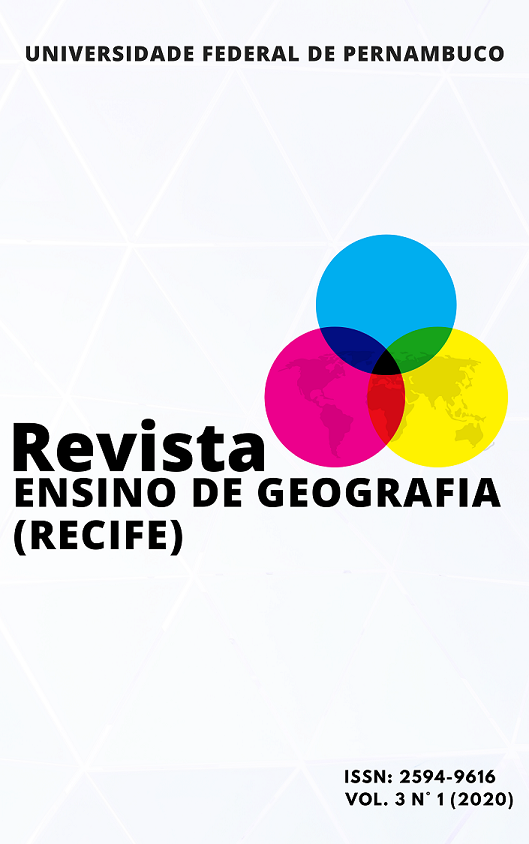Design and topofilia: facilitating resources in the geographical category teaching learning process
DOI:
https://doi.org/10.51359/2594-9616.2020.243360Keywords:
Topofilia, Cartografia, Geografia, Ensino de geografia, categorias geográficas.Abstract
The personal expressiveness of each individual about a space in which a feeling is expressed, sometimes negative, sometimes positive, is fundamental to identify subjectivity and feelings of belonging, or not, to a given portion of the space. What must have a syntagmatic relevance to reflect the subjective perspectiveof the categories of geographic science used in daily life. With the objective of analyzing the methodological practices of basic education teachers, especially those in the discipline of geography, it is envisaged to contribute with new methodologies forthe teaching-learning process of themes related to cartography and cartographic literacy; seeking to relate the making of drawings with spatial representativeness, based on the activities proposed in the teacher training course. The methodology consists of associating the understanding of the concept of topophilia, which is expressed when space is part of a family, personal and belonging experience, or even its dialogical pair, spatial aversion, which is presented in the idea of topophobia. For this purpose, through an experience report, some examples made during an evaluative activity and the ways they were referenced by their exhibitors are exposed through a practical analysis of the feeling that is outlined, given the presentation in the form of drawing and related to themes of spatiality, representation and cartographic products.
References
CASTELLAR, Sonia Vanzella. “A Cartografia e a construção do conhecimento em contexto escolar”. In: ALMEIDA, Rosângela Doin de (Org.). Novos rumos da cartografia escolar: currículo, linguagem e tecnologia. São Paulo: Contexto, 2011, p. 121-135.
FRANCISCHETT, Mafalda Nesi. “Aspectos da aprendizagem das representações cartográficas no ensino de Geografia”. In: PORTUGAL, Jussara Fraga; CHAIGAR, Vânia Alves Martins (Org.). Cartografia, cinema, literatura e outras linguagens no ensino de Geografia. Curitiba, PR: CRV, 2012, p. 175-184.
GOMES, Luiz Vidal Negreiros. Desenhismo. Santa Maria: Universidade Federal de Santa Maria, 1996.
OLIVEIRA, Simone Santos de. Desenho e cartografia escolar no ensino de Geografia. Geografia, Ensino & Pesquisa, Vol. 20 (2016), n.3, p. 78-86. 2016
FROEBEL, Friedrich W. A. A educação do homem. Tradução de Maria Helena Câmara Bastos. Passo Fundo: UPF, 2001.
MENDES, Raquel Almeida; SOUSA, Elaine da Silva; PEREIRA, Aires José. A importância da categoria lugar no ensino de geografia: um estudo de caso na escola estadual modelo em Araguaína – TO. Revista Tocantinense de Geografia, Araguaína (TO), Ano 06, n. 11, set/dez. 2017.
TRINCHÃO, Glaucia Maria Costa. Didáticas e discursos em defesa do Desenho como objeto de ensino e de sua inserção na instrução pública luso-brasileira. Revista História da Educação. V. 13, n. 29, p. 79-113, set./dez, 2009.
TUAN, Yi-Fu. Espaço e Lugar: a perspectiva da experiência: Difel, 1983.
TUAN, Yi Fu. Topofilia, um estudo da percepção, atitude e valores do meio ambiente; tradução: Lívia de oliveira. Londrina: Eduel, 2012.
Downloads
Published
How to Cite
Issue
Section
License
Copyright (c) 2021 Rodrigo Nascimento Bentes, LUIZ AUGUSTO SOARES MENDES

This work is licensed under a Creative Commons Attribution 4.0 International License.
Authors who publish with this journal agree to the following terms:- Authors retain copyright and grant the REVISTA ENSINO DE GEOGRAFIA (RECIFE) right of first publication with the work simultaneously licensed under a Creative Commons Attribution NonCommercial International 4.0 (CC BY-NC) that allows others to share the work with an acknowledgement of the work's authorship and initial publication in this journal.
- Authors are able to enter into separate, additional contractual arrangements for the non-exclusive distribution of the journal's published version of the work (e.g., post it to an institutional repository or publish it in a book), with an acknowledgement of its initial publication in this journal.
- Authors are permitted and encouraged to post their work online (e.g., in institutional repositories or on their website) prior to and during the submission process, as it can lead to productive exchanges, as well as earlier and greater citation of published work.



